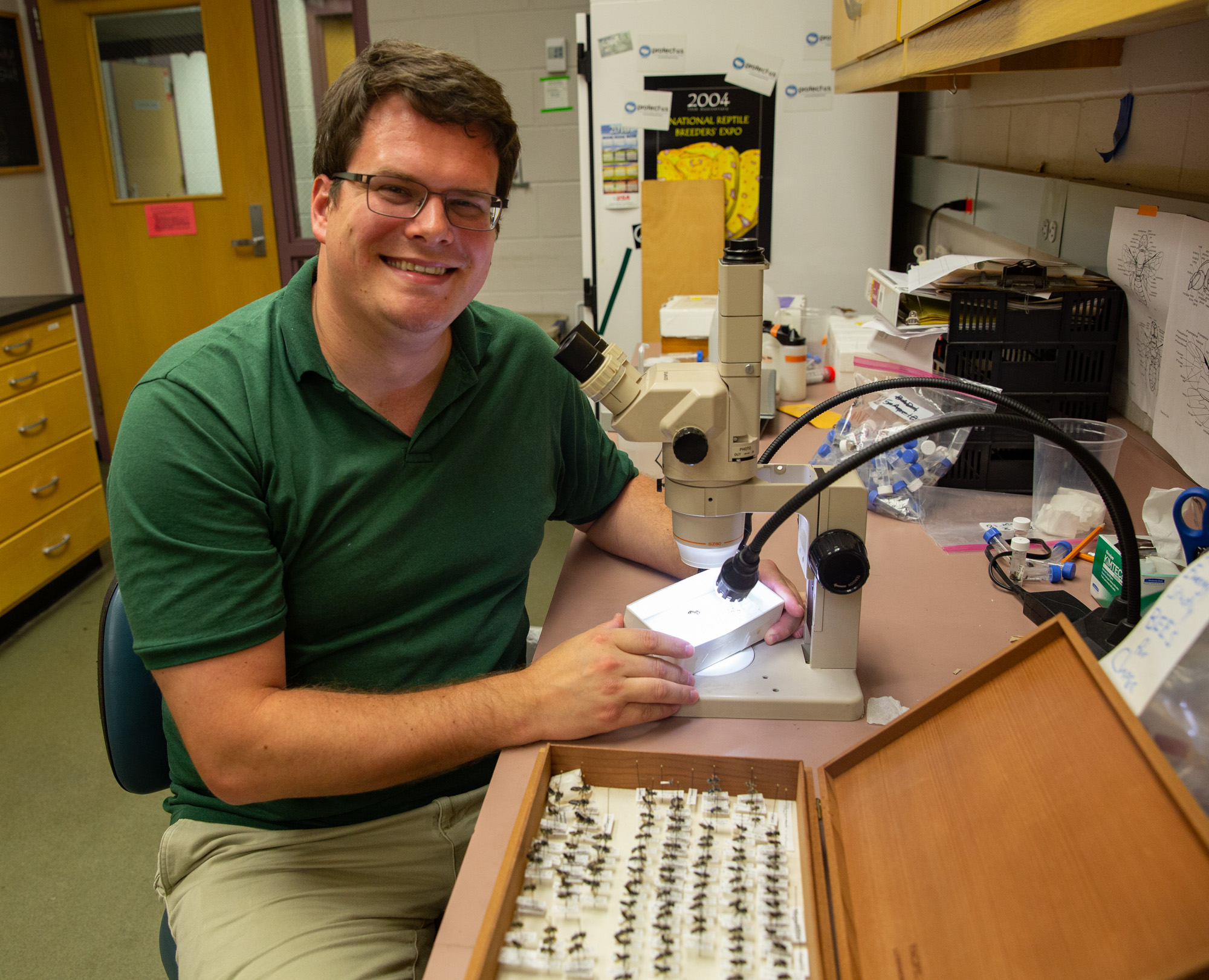Chase Billingsley Kimmel, Ph.D. 
Postdoctoral Associate
E-mail: cbkimmel@ufl.edu
Current research:
As a postdoctoral associate, most of my research revolves around conservation and restoration of pollinators and their habitat. The goal of much of my research is to examine how land managers can better manage flower-visitors for conservation/restoration purposes. We recently concluded a utility right-of-way project for Duke Energy investigating how different vegetation management practices impact the floral and flower-visiting insect communities. Additionally, I am working on other projects involving how other management practices (e.g. mowing and prescribed fire) impact the floral and insect-community so we can better understand the impacts that we have on our natural world. My current research investigates the distribution, ecology, and habitat requirements of the blue calamintha bee (Osmia calaminthae), considered to be one of the most imperiled and geographically restricted native bee species in North America.
Previous education/experience:
I earned my B.A. in Mathematics in addition to receiving a high school teacher’s license from Hanover College in Hanover, Indiana in May of 2007. In December of 2010, I earned my M.S. in Environmental Science with a concentration in Applied Ecology. Prior to coming to the University of Florida, I worked with a consulting group as an environmental scientist responsible for environmental compliance of many planning projects throughout the Midwest. I obtained my Ph.D. from the University of Florida in December of 2017 investigating the impacts of different fire regimes on the flower-visiting insect community. Since then I have been a postdoctoral associate at the FLMNH where I have continued pollinator research as well as had the opportunity to teach at the entomology department.
Publications:
Boncristiani, H., J. D. Ellis, T. Bustamante, J. Graham, C. Jack, C. B. Kimmel, A. Mortensen, D. Schmehl. 2020. World honey bee health: the global distribution of western honey bee (Apis mellifera L.) pests and pathogens. Bee World. DOI: 10.1080/0005772X.2020.1800330
Campbell, J. W., C. B. Kimmel, S. M. Grodsky, C. Smithers, J. Daniels, and J. D. Ellis. 2019. Wildflower plantings harbor increased arthropod richness and abundance within agricultural areas in Florida (USA). Ecosphere, 20, e02890.
Abbate, A., J. W. Campbell, C. B. Kimmel, and W. H. Kern. 2019. Urban development decreases bee abundance and diversity within coastal dune systems. Global Ecology and Conservation, 20, e00711.
Daniels, J., C. Kimmel, S. McClung, S. Epstein, J. Bremer, and K. Rossetti. 2018. Better understanding the potential importance of Florida roadside breeding habitat for the Monarch. Insects 9(4), 137.
Campbell, J., C. B. Kimmel, M. Bammer, C. Stanley-Stahr, J. C. Daniels, and J. D. Ellis. 2018. Managed and wild bee flower visitors and their potential contribution to pollination servies of low-chill highbush blueberry (Vaccinium corymbosum L.). Journal of Economic Entomology, 111(5), 2011-2016.
Campbell, J., C. Smithers, A. Irvin, C. B. Kimmel, C. Stanley-Stahr, J. C. Daniels, and J. Ellis. 2017. Trap nesting wasps and bees in agriculture: A comparison of sown wildflower and fallow plots in Florida. Insects 8(4), 107.
Campbell, J., J. O’Brient, J. Irvin, C. Kimmel, J. Daniels, and J. Ellis. 2017. Managed bumble bees (Bombus impatiens) (Hymenoptera: Apidae) caged with blueberry bushes at high density did not increase fruit set or weight compared to open pollination. Environmental Entomology, 46(2), 237-242.
Campbell, J. W., B. E. Campbell, C. B. Kimmel, and P. Galvan. 2016. Observations of insect visitors to Price’s Potato Bean (Apios priceana, Fabaceae) in North Alabama, USA. Plant Ecology and Evolution, 149(3), 316-318.
Mortenson, A. N., D. R. Schmehl, M. Allsopp, T. A. Bustamante, C. B. Kimmel, M. E. Dykes, and J. D. Ellis. 2015. Differences in Varroa destructor infestation rates of two indigenous subspecies of Apis mellifera in the Republic of South Africa. Experimental and Applied Acarology, 68(4), 509-515.